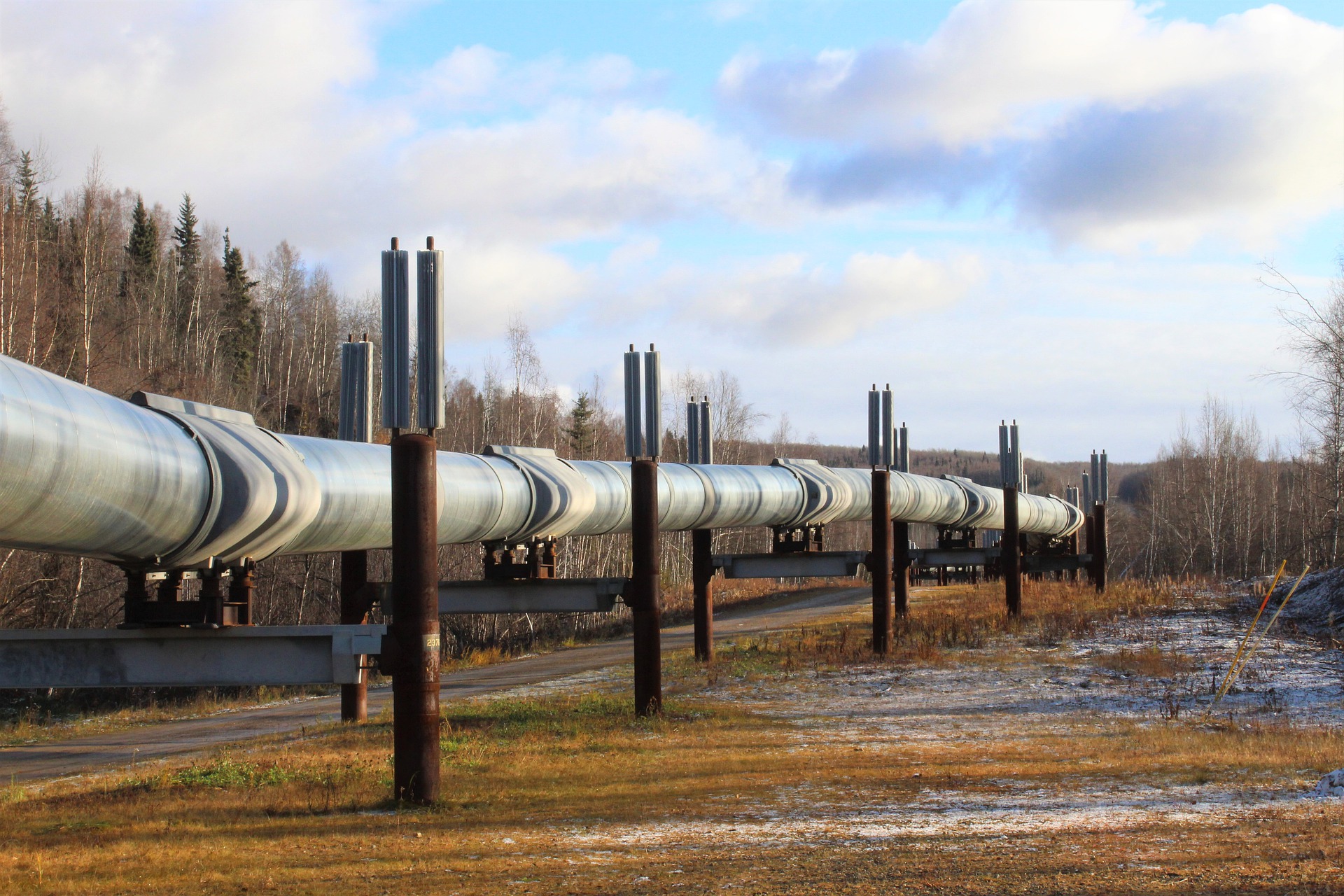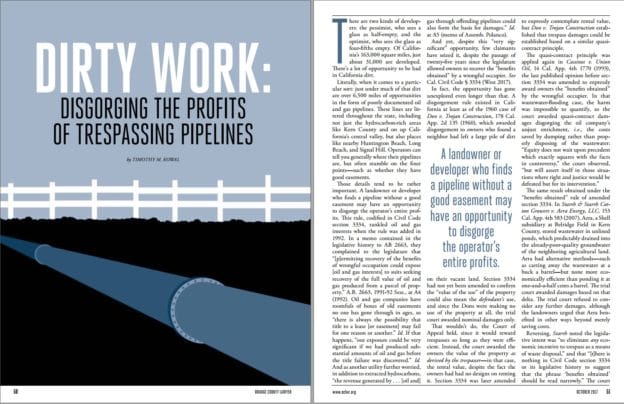

There are two kinds of developers: the pessimist, who sees a glass as half-empty, and the optimist, who sees the glass as four-fifths empty. Of California’s 163,000 square miles, just about 31,000 are developed. There’s a lot of opportunity to be had in California dirt.
Literally, when it comes to a particular sort: just under much of that dirt are over 6,500 miles of opportunities in the form of poorly documented oil and gas pipelines. These lines are littered throughout the state, including not just the hydrocarbon-rich areas like Kern County and on up California’s central valley, but also places like nearby Huntington Beach, Long Beach, and Signal Hill. Operators can tell you generally where their pipelines are, but often stumble on the finer points—such as whether they have good easements.
Those details tend to be rather important. A landowner or developer who finds a pipeline without a good easement may have an opportunity to disgorge the operator’s entire profits. This rule, codified in Civil Code section 3334, rankled oil and gas interests when the rule was added in 1992. In a memo contained in the legislative history to AB 2663, they complained to the legislature that “[p]ermitting recovery of the benefits of wrongful occupation could expose [oil and gas interests] to suits seeking recovery of the full value of oil and gas produced from a parcel of property.” A.B. 2663, 1991-92 Sess., at A4 (1992). Oil and gas companies have roomfuls of boxes of old easements no one has gone through in ages, so “there is always the possibility that title to a lease [or easement] may fail for one reason or another.” Id. If that happens, “our exposure could be very significant if we had produced substantial amounts of oil and gas before the title failure was discovered.” Id. And as another utility further worried, in addition to extracted hydrocarbons, “the revenue generated by . . . [oil and] gas through offending pipelines could also form the basis for damages.” Id. at A5 (memo of Assemb. Polanco).
And yet, despite this “very significant” opportunity, few claimants have seized it, despite the passage of twenty-five years since the legislature allowed owners to recover the “benefits obtained” by a wrongful occupier. See Cal. Civil Code § 3334 (West 2017).
A landowner or developer who finds a pipeline without a good easement may have an opportunity to disgorge the operator’s entire profits.
In fact, the opportunity has gone unexplored even longer than that. A disgorgement rule existed in California at least as of the 1960 case of Don v. Trojan Construction, 178 Cal. App. 2d 135 (1960), which awarded disgorgement to owners who found a neighbor had left a large pile of dirt on their vacant land. Section 3334 had not yet been amended to confirm the “value of the use” of the property could also mean the defendant’s use, and since the Dons were making no use of the property at all, the trial court awarded nominal damages only.
That wouldn’t do, the Court of Appeal held, since it would reward trespasses so long as they were efficient. Instead, the court awarded the owners the value of the property as derived by the trespasser—in that case, the rental value, despite the fact the owners had had no designs on renting it. Section 3334 was later amended to expressly contemplate rental value, but Don v. Trojan Construction established that trespass damages could be established based on a similar quasi-contract principle.
The quasi-contract principle was applied again in Cassinos v. Union Oil, 14 Cal. App. 4th 1770 (1993), the last published opinion before section 3334 was amended to expressly award owners the “benefits obtained” by the wrongful occupier. In that wastewater-flooding case, the harm was impossible to quantify, so the court awarded quasi-contract damages disgorging the oil company’s unjust enrichment, i.e., the costs saved by dumping rather than properly disposing of the wastewater:
“Equity does not wait upon precedent which exactly squares with the facts in controversy,” the court observed, “but will assert itself in those situations where right and justice would be defeated but for its intervention.”
The same result obtained under the “benefits obtained” rule of amended section 3334. In Starrh & Starrh Cotton Growers v. Aera Energy, LLC, 153 Cal. App. 4th 583 (2007), Aera, a Shell subsidiary at Belridge Field in Kern County, stored wastewater in unlined ponds, which predictably drained into the already-poor-quality groundwater of the neighboring agricultural land. Aera had alternative methods—such as carting away the wastewater at a buck a barrel—but none more economically efficient than ponding it at one-and-a-half cents a barrel. The trial court awarded damages based on that delta. The trial court refused to consider any further damages, although the landowners urged that Aera benefited in other ways beyond merely saving costs.
Reversing, Starrh noted the legislative intent was “to eliminate any economic incentive to trespass as a means of waste disposal,” and that “[t]here is nothing in Civil Code section 3334 or its legislative history to suggest that the phrase ‘benefits obtained’ should be read narrowly.” The court remanded to consider other potential benefits, provided “there is a direct link between the financial benefit and the trespass.” This appears to carry forward a similar quasi-contract analysis as Don v. Trojan Construction and Cassinos.
The only other case to award “benefits obtained” damages is Bailey v. Outdoor Media Group, 155 Cal. App. 4th 778 (2007), as readers will recognize from Dan Jacobsen’s article in the January 2015 issue of this magazine. See Dan Jacobsen, Not Your Parents’ Trespass Damages, Orange County Lawyer, Jan. 2015, at 28. Bailey is notable for expanding the disgorgement remedy twice: by applying it outside the toxic-pollution context, and by disgorging the occupier’s profits, not just the costs saved. In that case, a billboard operator continued running ads without a valid lease. The upshot of section 3334 is it puts the landowner in the “catbird seat,” and the occupier acts at its own peril:
A trespasser remains in possession of the property at its peril. . . . Stated bluntly, [the landowner] was in the catbird seat, and given his superior position, [the occupier] remained in possession of the property at peril of ultimately being held liable for damages measured under section 3334 by the benefits obtained by reason of its wrongful occupancy.
Bailey, 155 Cal. App. 4th at 791.
Bailey even left the door open for recovering gross profits in certain cases. And yet, there are no reports to date of landowners accepting the invitation.
The biggest missed opportunity recently might be the class action against the makers of Pokémon Go. The app earned a staggering 500 million downloads in 2016 by making certain landowners’ property part of its popular “pocket monster” game in which users look for virtual characters and destinations in real-world locations. A collaboration between game giant Nintendo and newcomer Niantic, the boundaries-no-object global scavenger hunt is estimated to have earned just under a billion dollars in revenue in 2016 alone, adding several billions to Nintendo’s market value. Under Civil Code section 3334 and Bailey, the property owners who found themselves virtually trampled underfoot could have sought disgorgement of Niantic and Nintendo’s profits from their wildly successful treasure hunt. Yet plaintiffs did not raise these California authorities in their pleadings, or apparently in opposing defendants’ motions to dismiss.
Solano County alfalfa farmers also likely missed a disgorgement opportunity when they found a gas pipeline under their fields in the early 2000s. The alfalfa croppers prevailed at trial, only to obtain a judgment for nominal damages, since the pipelines had not caused them any harm. The Court of Appeal reversed in Bello v. ABA Energy Corp., 121 Cal. App. 4th 301 (2004), holding the pipeline, operating under a county permit, was valid under the more modern, expansive scope of public rights-of-way. But prior to appeal, you can bet that a disgorgement judgment based on the statutory five-years’ worth of naturalgas profits would have improved the alfalfa concern’s ability to negotiate a favorable settlement.
But despite the pipeline industry’s admission of the likelihood of errant pipelines, there are oddly few cases bringing claims on them. One explanation is the energy companies were on the hyperbolic side in their earlier fulminations against the disgorgement rule, and there simply aren’t very many pipelines operating without good title. Then again, in 2014, a Bakersfield developer found four wild pipelines in a single parcel, and none of the operators would move their pipelines until the author’s firm filed a federal complaint and obtained a mandatory preliminary injunction. It seems still likely, then, that the opportunities are there but that landowners don’t know quite where to look, or how.
The looking, however, might be easier than you think, courtesy of, ironically enough, the energy industry. It starts with a toll-free call to 8-1-1. That’s the number to DigAlert, a nonprofit corporation created and funded by pipeline operators. See Gov. Code § 4216 et seq. (West 2017). DigAlert can notify the operators of any pipelines in a property where a project is planned: building expansions, housing additions, landscaping, retaining wall construction, repaving, etc. DigAlert previously required that the project be ready to break ground, but will now also respond during the planning phase. Simply mark the proposed project area and, once you obtain the locations of the pipelines, check them against a current title report. If there are pipelines without easements of record, demand that the operators either supply any other evidence of their right to operate on your property, or write a check for its benefits obtained pursuant to section 3334 by wrongfully occupying the property for the past five years.
A quarter-century has passed since oiland gas-pipeline operators bemoaned their substantial exposure for their stray pipelines. There’s still time to make their predictions come true.
Timothy M. Kowal is a civil litigator and appellate lawyer specializing in trespass, land use, and business law. He can be reached at tkowal@tvalaw.com.
This article first appeared in Orange County Lawyer, October 2017 (Vol. 59 No. 10), p. 50. The views expressed herein are those of the author. They do not necessarily represent the views of Orange County Lawyer magazine, the Orange County Bar Association, the Orange County Bar Association Charitable Fund, or their staffs, contributors, or advertisers. All legal and other issues must be independently researched.